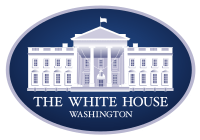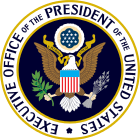National Economic Council (United States)
The National Economic Council (NEC) of the United States is the principal forum used by the President of the United States for considering economic policy matters, separate from matters relating to domestic policy, which are the domain of the Domestic Policy Council. The council forms part of the Office of White House Policy which contains the National Economic Council and other offices. The Director of the NEC is titled the Assistant to the President for Economic Policy and Director of the National Economic Council. The NEC is distinct from the Council of Economic Advisers (CEA), which was established in 1946. The CEA provides much of the objective empirical research for the White House and prepares the annual Economic Report of the President.
 | |
| Agency overview | |
|---|---|
| Formed | 1993 |
| Headquarters | Eisenhower Executive Office Building Washington, DC |
| Employees | 25 |
| Agency executive |
|
| Parent agency | Office of White House Policy |
History and mission
The National Economic Council was created on January 25, 1993,[1] by Executive Order 12835, to coordinate the economic policy making process and provide economic policy advice to the President. The Council also ensures that economic policy decisions and programs are consistent with the President's stated goals, and monitors the implementation of the President's economic goals.[2] Its creation fulfilled a major campaign pledge of President Bill Clinton to put the then current economic situation of the United States at the forefront of federal policy making.[3]
Even before the formal creation of the NEC, some form of an economic policy staff had existed in the White House since the 1960s. President Lyndon B. Johnson assigned a senior-level aide to organize staff and develop domestic policy, which included economic policy. In 1970, President Richard Nixon issued an executive order that created the Office of Policy Development, a large White House office with jurisdiction over economic and domestic policy. President Bill Clinton again altered the structure by splitting the office, as mentioned above, both parts of which exist today underneath the umbrella of the Office of White House Policy, which can also be known as the Office of Policy Development.[4]
The NEC has four principal functions: to coordinate policy-making for domestic and international economic issues, to coordinate economic policy advice for the President, to ensure those policy decisions and programs are consistent with the President's economic goals, and to monitor implementation of the President's economic policy agenda.[5]
Organization
The NEC comprises numerous department and agency heads within the administration whose policy jurisdictions affect the nation's economy. The NEC Director, in conjunction with these officials, coordinates and implements the President's economic policy objectives. The Director is supported by a staff of policy specialists in various fields including agriculture, commerce, energy, financial markets, fiscal policy, healthcare, labor, and Social Security.[5]
Directors of the National Economic Council
| Officeholder | Term start | Term end | President |
|---|---|---|---|
| Robert Rubin | January 25, 1993 | January 11, 1995 | Bill Clinton |
| Laura Tyson | February 21, 1995 | December 12, 1996 | |
| Gene Sperling | December 12, 1996 | January 20, 2001 | |
| Lawrence B. Lindsey | January 20, 2001 | December 12, 2002 | George W. Bush |
| Stephen Friedman | December 12, 2002 | January 10, 2005 | |
| Allan B. Hubbard | January 10, 2005 | November 28, 2007 | |
| Keith Hennessey | November 28, 2007 | January 20, 2009 | |
| Lawrence Summers | January 20, 2009 | December 31, 2010 | Barack Obama |
| Gene Sperling | January 20, 2011 | March 5, 2014 | |
| Jeffrey Zients | March 5, 2014 | January 20, 2017 | |
| Gary Cohn | January 20, 2017 | April 2, 2018 | Donald Trump |
| Larry Kudlow | April 2, 2018 | Incumbent |
Membership
| Structure and Membership of the United States National Economic Council (As of July 26, 2020) | |
|---|---|
| Chair | |
| Director |
|
| Deputy Director |
|
| Deputy Director |
|
| Regular attendees |
|
| Additional participants |
|
References
- McMinn, Sean; McMinn, Sean (January 23, 2017). "Graphic: How Presidents Have Used Executive Orders in Their First 100 Days". Roll Call. Retrieved February 2, 2018.
- Keith Hennessey (September 22, 2010). "Should you be the next Larry Summers?". CNN.com. Archived from the original on February 2, 2017. Retrieved March 29, 2012.
- Kathy Gill. "White House National Economic Council". About.com. Retrieved March 29, 2012.
- "Domestic Policy Council". White House Administration. White House. Archived from the original on February 26, 2010. Retrieved February 26, 2010.
- "National Economic Council". White House Administration. White House. Retrieved February 26, 2010.
- "White House announces new NEC staff amid departures". Politico. Retrieved August 12, 2018.
Further reading
- Sarah Rosen Wartell. "The White House: National Economic Council." In Change for America: A Progressive Blueprint for the 44th President. Edited by Mark Green and Michele Jolin, pp. 15–22. Washington: The Center for American Progress Action Fund, 2008.
